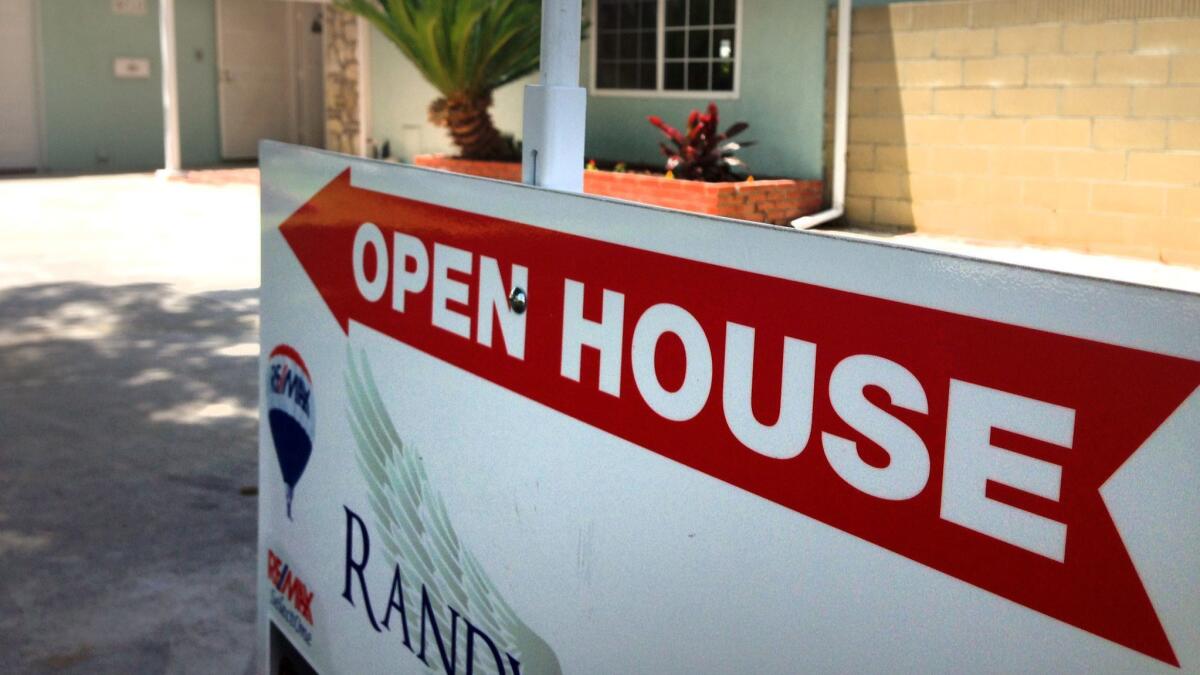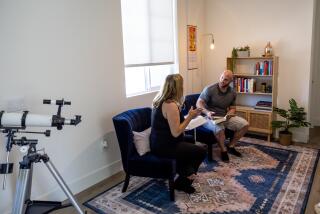Zillow will buy your home directly. And it just brought the service to Southern California

- Share via
Selling your home can be a headache. There’s the real estate agent to find, the open houses to hold, the bids to weigh. And then, at the very end, there’s the wait for something that may not even happen: financing.
A growing number of companies are looking to simplify and speed the process. Zillow, Opendoor and others are buying homes directly from consumers in select markets across the country, pitching a hassle-free experience in which you pick your own closing date.
On Tuesday, Zillow announced it will bring its direct-buy program to California for the first time, beginning early next year in Riverside and San Bernardino counties. Zillow Offers will then be in eight markets across the country, including Las Vegas, Phoenix and Denver. It plans to expand further but declined to say whether that includes more California markets.
Other similar companies — known in the industry as i-buyers — are already here. Opendoor, a San Francisco firm, advertises its services in the Inland Empire and Sacramento. Redfin will buy your home in the Inland Empire, as well as San Diego and Orange counties.
CashCall founder John Paul Reddam is also a director of a company called Owning, which has scooped up properties in Huntington Beach, Lakewood and elsewhere in Southern California.
Those are the latest attempts to shake up a home-buying process that’s remained largely the same for decades.
“What they see is a massive opportunity,” said Rick Palacios, director of research at John Burns Real Estate Consulting in Irvine. “I have had to sell a home. It took three escrows and it’s a pain.”
Like the others, Zillow’s pitch is convenience. Would-be sellers enter their address online, answer a few questions about the home and send in some photos. Zillow says it takes that info, its online “Zestimate” and the advice of a local real estate agent, then spits out a preliminary offer within about two business days.
After Zillow conducts an in-person walk-through, homeowners get a confirmed offer. They can pick a guaranteed closing date, anywhere from seven to 90 days after signing a deal.
Zillow said it typically charges the equivalent of 6% to 9% of the purchase price as a fee, compared with the roughly 5% to 6% total commission charged in a normal transaction. It makes needed repairs and puts the home on the market. The fee varies with the cost of repairs, estimated hold time for the properties and other factors.
A major risk for i-buyers is a declining market, in which falling home prices mean they’re suddenly holding scores of houses that are worth less than what they purchased them for. Already, markets are softening, with home sales declining and price appreciation slowing in Southern California and elsewhere in the U.S. In October, homes sales in the Inland Empire fell 5.8% from a year earlier, according to CoreLogic. And although prices are still rising, the rate of increase has slowed, from 8.4% in March and April to 5.4% for October.
But Jeremy Wacksman, president of Zillow, said the company isn’t banking on a rising market to make money. Instead, Zillow is banking on rapid turnover and scale.
In the Inland Empire, Zillow said it’s looking to purchase homes priced from $200,000 to $600,000 that don’t need tons of work, but noted it can be flexible. The company also said it won’t engage in bidding wars if a seller gets a higher offer. When it does buy a home, Zillow aims to resell it within 90 days, faster than the traditional flip.
Brad Berning, a senior research analyst with Craig-Hallum Capital Group, said the Inland Empire was a good market in which to launch in California. It is possible to purchase more homes because the area is cheaper than the coast. And vast tracts of similar houses were built in recent decades, making it easier to run an algorithm and come up with an accurate market value.
The concept of direct buying isn’t entirely new. For decades, some real estate brokers have offered to buy a house if they couldn’t sell it. And investors have affixed homemade signs to utility poles that promise to buy your house fast with cash. What’s different this time is the money behind it.
Redfin and Zillow are publicly traded companies. So is Realogy, a real estate services firm that owns Coldwell Banker. Earlier this year, it announced a direct-offer program with its partner Home Partners of America, which is backed by massive investment firms KKR & Co. and BlackRock.
Berning estimates that by 2021 i-buyers could account for about 10% of the existing home-sale market. They provide a measure of certainty, a rare commodity in the usual home-selling process. For instance, they offer the option of picking a quick closing date or putting it off for a while — flexibility that makes it easier to find another home. Zillow said if someone wanted to close faster than seven days or take longer than 90 days, it’s not guaranteed but is possible.
“We have closed on a house in as little as five days because we wanted to help the seller who was in a time crunch,” Zillow spokeswoman Jordyn Lee said.
Berning doubted the expansion of i-buyers would put much upward pressure on home prices because the companies are usually buying homes for less than what someone could get on the open market. He said their business model isn’t to gut the house for major repairs that will command top dollar, but rather earn money through more efficiently matching buyers and sellers.
It’s that certainty of a quick sale that Palacios said has drawn the interest of major home builders, which can have sales fall through if buyers can’t unload their old home. Lennar Corp., for example, has invested in Opendoor, and the two companies pitch a “seamless experience” in which you can sell to Opendoor and purchase a “Lennar dream home.”
Palacios called that partnership a “natural handoff.”
Twitter: @khouriandrew
More to Read
Inside the business of entertainment
The Wide Shot brings you news, analysis and insights on everything from streaming wars to production — and what it all means for the future.
You may occasionally receive promotional content from the Los Angeles Times.











